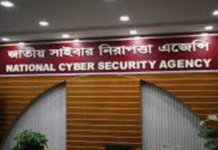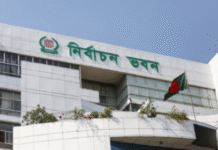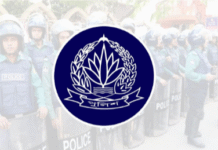By Anbarasan Ethirajan

Saraswati Rani Das ran for her life with her two young children when a Muslim mob rampaged through her village in the southern Noakhali district of Bangladesh.
Mrs Das broke down repeatedly as she tried to explain how their tiny tin-roof house was destroyed and set on fire.
The attack started hours after a senior hardline Islamist leader was sentenced to death by a special tribunal in late February.
Jamaat-e-Islami party Vice President Delwar Hossain Sayedee was given a death sentence for crimes committed during the war of independence from Pakistan in 1971.
The sentencing triggered a wave of angry protests from the Islamist party’s supporters. In many districts, buildings and vehicles were damaged. More than 60 people were killed in clashes with the security forces.
Living in fear
Minority Hindu and Buddhist communities bore the brunt of the attacks as their houses and temples were vandalised and burnt down.
“We heard the mob was coming towards our house. So, we just ran away. Our house was completely burnt. They looted all our belongings, including our savings. We have lost everything,” Mrs Das says.
The village of Aladin Nagar, about 120km (75 miles) south of the capital Dhaka, was strewn with torn tin sheets, broken glass, food grain, damaged books and burnt bicycles.
Its residents have been living in fear since the attack and are afraid that they may be targeted again.
Hindu community leaders allege that the attacks were co-ordinated and widespread. So far, they say, more than 50 temples have been damaged and more than 1,500 houses destroyed in the attacks, which took place in nearly 20 districts over the last few weeks.
In some villages near the southern city of Chittagong, statues of Buddha were damaged and Buddhist temples were vandalised.
But the authorities say that such crimes will not go unpunished.
“We are fully committed to protecting the minorities. We have taken enough measures so that these people are not attacked in the future. We have also provided sufficient relief,” Home Minister Mohiuddin Khan Alamgir told the BBC.
‘Targeted again’
Hindus make up nearly 10% of the population of about 153 million in this Muslim-majority nation. The two communities live side by side in villages across Bangladesh.
Muslim community leaders have condemned the attacks.
“This should not have happened. We feel sorry about it. It is not in the Holy Koran,” Noakhali district cleric Mohammad Nurul Alam Bhuiyan said.
While people like Mrs Das witnessed communal violence for the first time, Hindu businessmen like Subash Chandra Ghosh in southern Satkhira district say it was similar to what happened to them in 1971, when Bangladesh fought a bloody nine-month war against Pakistan to gain independence.
“In 1971, our house was damaged and our neighbour’s house was set on fire by anti-liberation forces. We are being targeted again. What should we do?” laments Mr Ghosh, who fought for independence.
Some say the minorities are attacked because they mostly support the governing Awami League party and are a soft target.
Bangladesh has long prided itself on its secular values – but that image has taken a knock following the recent violence.
Buddhist villages in Cox’s Bazar district also came under attack by Muslim mobs last year, when an image allegedly insulting the Koran was posted on Facebook by a Buddhist youth. Many Buddhist temples were vandalised in the subsequent violence.
War crimes
Investigations by the local media later revealed the youth had nothing to do with the incident.
The independence war came to an end after India sent in troops on behalf of the Bengalis. More than 90,000 Pakistani soldiers and officers surrendered to the Indian army and were taken as prisoners of war.
Official estimates say more than three million were killed and tens of thousands of women raped during the war. The minority Hindu community suffered disproportionately because some Pakistanis blamed them for Bangladesh’s secession.
A special tribunal in Bangladesh is prosecuting those accused of collaborating with Pakistani forces and carrying out atrocities more than 40 years ago.
The recent violence is mainly blamed on the opposition Jamaat-e-Islami party, whose leaders are facing war crimes at the tribunal. But the party – which opposed Bangladesh’s independence from Pakistan – denies the charges.
“The Jamaat-e-Islami is a peaceful political party and they do not encourage any violent activities. People who took part in the attack on minorities belong to other political parties,” asserts Mohammad Tajul Islam, a Jamaat leader in Noakhali district.
Hindu community leaders say the attacks are systematic and have been going on for years. They say they are not only carried out by hardline Islamists but also by supporters of other mainstream political parties, including the Awami League and the main opposition Bangladesh Nationalist Party.
The aim of the violence, Hindu leaders allege, is to grab land and other property. As a result, they say, many Hindus are fleeing to India to escape harassment, intimidation and violence.
“In 1947, Hindus constituted around 30% of the population,” says Subroto Chowdhury, a Hindu community leader in Dhaka.
“Now it is less than 10%. Hindus are being warned to leave so that locals can take over their land and houses.
“Our community is being persecuted.”
But Mr Alamgir, the home minister, says historically there have been movement of Hindus to India and Muslims to Bangladesh – because of various incidents.
“These are aberrations. The governments of the two countries are determined to make sure that they stay in full peace and security.”
And people like Mr Ghosh say they will resist attempts to drive them away from Bangladesh.
“This is our motherland and we have been living here for 25 generations. We cannot imagine of leaving this land. This is our country.”
Source: BBC









